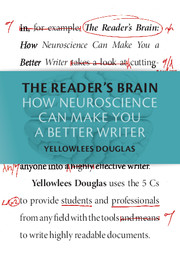Book contents
- Frontmatter
- Dedication
- Contents
- Acknowledgments
- 1 So much advice, so much lousy writing
- 2 The new science of writing
- 3 Choosing words and structuring sentences The first C: Clarity
- 4 Putting sentences together The second C: Continuity
- 5 Organizing paragraphs and documents The third C: Coherence
- 6 Maximizing efficiency The fourth C: Concision
- 7 Making music with words The fifth C: Cadence
- Supplement: Everything you ever wanted to know about grammar, punctuation, and usage – and never learned
- Endnotes
- Select Bibliography
- Index
1 - So much advice, so much lousy writing
Published online by Cambridge University Press: 05 July 2015
- Frontmatter
- Dedication
- Contents
- Acknowledgments
- 1 So much advice, so much lousy writing
- 2 The new science of writing
- 3 Choosing words and structuring sentences The first C: Clarity
- 4 Putting sentences together The second C: Continuity
- 5 Organizing paragraphs and documents The third C: Coherence
- 6 Maximizing efficiency The fourth C: Concision
- 7 Making music with words The fifth C: Cadence
- Supplement: Everything you ever wanted to know about grammar, punctuation, and usage – and never learned
- Endnotes
- Select Bibliography
- Index
Summary
Most people shun writing the way any chordate instinctively shuns pain. The task of writing is inescapably labor-intensive, no matter how facile a writer you are. Every blank page demands its lines of coherent sentences and cohesive paragraphs that ultimately amount to something like a rational, convincing argument. But our fear of writing reaches far beyond the hours we know we'll sweat over a keyboard, colonizing our blank screens with words. Instead, most of us are less afraid of the hard work than of grappling for hours with a complex system whose working parts we barely know. As a professor who has taught writing for more years than I'd care to publicly admit, I've heard thousands of confessions that gush out of students. I'm a terrible writer, they confess. Or, Writing's my major weakness. Strikingly, the majority of students who make these confessions are fairly strong writers – just as the students who assure me that they're good writers tend to create fresh paragraphs whenever they feel the reader needs to see a bit of white space, rather than from any sense of a paragraph as a coherent entity. Obviously, some sort of odd phenomenon must be at work here, when college students and even seasoned professionals have no idea whether their writing skills are adequate for a stringer position on the New York Times or barely pass muster as a child reporter writing for the East Palatka Elementary Gazette. Try making a similar analogy for reading or analytical skills, and you'll discover most people have a sound grasp of their abilities in these areas. But when the discussion turns to writing, a disconcerting number of us find ourselves at sea.
Three aspects of writing: micro, macro, middle
We struggle to even assess our writing ability because writing itself is inherently complex. Most forms of writing demand simultaneous attention to – along with at least some tenuous mastery of – three aspects of writing: argument, correct usage, and the constituents that make for clear, effective sentences and paragraphs.
- Type
- Chapter
- Information
- The Reader's BrainHow Neuroscience Can Make You a Better Writer, pp. 1 - 9Publisher: Cambridge University PressPrint publication year: 2015

